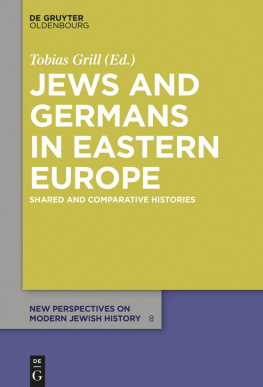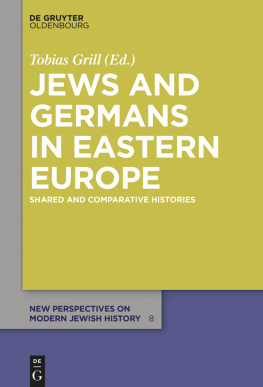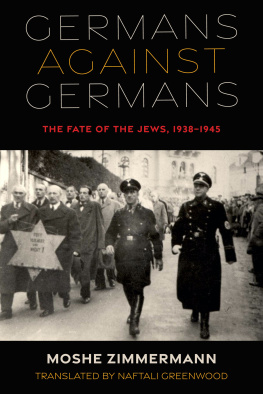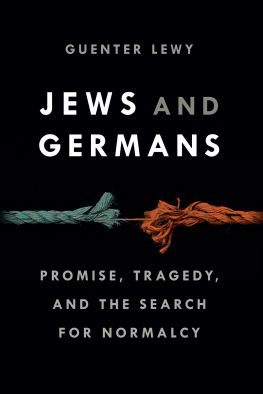Aly - Why the Germans? Why the Jews?: Envy, Race Hatred, and the Prehistory of the Holocaust
Here you can read online Aly - Why the Germans? Why the Jews?: Envy, Race Hatred, and the Prehistory of the Holocaust full text of the book (entire story) in english for free. Download pdf and epub, get meaning, cover and reviews about this ebook. year: 2014, publisher: Henry Holt and Co., genre: Romance novel. Description of the work, (preface) as well as reviews are available. Best literature library LitArk.com created for fans of good reading and offers a wide selection of genres:
Romance novel
Science fiction
Adventure
Detective
Science
History
Home and family
Prose
Art
Politics
Computer
Non-fiction
Religion
Business
Children
Humor
Choose a favorite category and find really read worthwhile books. Enjoy immersion in the world of imagination, feel the emotions of the characters or learn something new for yourself, make an fascinating discovery.

- Book:Why the Germans? Why the Jews?: Envy, Race Hatred, and the Prehistory of the Holocaust
- Author:
- Publisher:Henry Holt and Co.
- Genre:
- Year:2014
- Rating:3 / 5
- Favourites:Add to favourites
- Your mark:
- 60
- 1
- 2
- 3
- 4
- 5
Why the Germans? Why the Jews?: Envy, Race Hatred, and the Prehistory of the Holocaust: summary, description and annotation
We offer to read an annotation, description, summary or preface (depends on what the author of the book "Why the Germans? Why the Jews?: Envy, Race Hatred, and the Prehistory of the Holocaust" wrote himself). If you haven't found the necessary information about the book — write in the comments, we will try to find it.
Aly: author's other books
Who wrote Why the Germans? Why the Jews?: Envy, Race Hatred, and the Prehistory of the Holocaust? Find out the surname, the name of the author of the book and a list of all author's works by series.
Why the Germans? Why the Jews?: Envy, Race Hatred, and the Prehistory of the Holocaust — read online for free the complete book (whole text) full work
Below is the text of the book, divided by pages. System saving the place of the last page read, allows you to conveniently read the book "Why the Germans? Why the Jews?: Envy, Race Hatred, and the Prehistory of the Holocaust" online for free, without having to search again every time where you left off. Put a bookmark, and you can go to the page where you finished reading at any time.
Font size:
Interval:
Bookmark:

The author and publisher have provided this e-book to you for your personal use only. You may not make this e-book publicly available in any way. Copyright infringement is against the law. If you believe the copy of this e-book you are reading infringes on the authors copyright, please notify the publisher at: us.macmillanusa.com/piracy.
CONTENTS
ACKNOWLEDGMENTS
The S. Fischer Foundation in Berlin generously supported this book, as did the International Institute for Holocaust Research at Yad Vashem, Jerusalem. My work there was underwritten by the Baron Friedrich Carl von Oppenheim Stipend for Research on Racism, Anti-Semitism, and the Holocaust. My research was made a lot easier and a lot more pleasant by my helpful and welcoming colleagues at Yad Vashem, who took an interest in my work and were always ready to discuss it.
The editor of this book in the original German was Walter Pehle. In his thirty-five years at the S. Fischer publishing house, Pehle brought out more than 250 books on the history of National Socialism and the persecution of European Jews. He always advised his authors with patience, conviction, and understanding. Pehle produced books about horrible crimes yet never lost his sense of humor. The manuscript for this volume was the last one he worked on before reluctantly retiring, at the age of seventy. As always, he checked every comma, and occasionally, as was his wont, he would ask me, What is the author trying to say here?before remarking, Maybe wed better take that out. He has my heartfelt gratitude for that and for our two decades of working together.
Id also like to express my gratitude to my editor at Metropolitan Books, Sara Bershtel, for her courage in taking on such a challenging project and her efforts to better present my ideas to an English-language audience. My thanks as well to Roslyn Schloss and Grigory Tovbis for their work. Finally, Id like to thank my translator, Jefferson Chase, for his love of the German and English languages. He repeatedly queried the exact meanings of words and phrases, and undercovered some minor mistakes in the German originalsomething only the best translators do.
TRANSLATORS NOTE
In the interests of making an extraordinarily complex historical investigation more comprehensible to an American audience, Gtz Alys German original has been revised for this edition. All changes have been made in consultation with the author.
INTRODUCTION
THE QUESTION OF QUESTIONS
WHY THE GERMANS? WHY THE JEWS?
Why did Germans murder six million men, women, and children who were guilty of nothing other than being Jews? How was this possible? How could a civilized, culturally diverse, and productive people release this sort of massive destructive energy?
In the nineteenth century, Jews who emigrated to Germany from neighboring countries in Eastern Europe felt great relief when they crossed the border. They appreciated the legal protections, economic freedom, and educational opportunities offered first by Prussia and later by the German Empire. Anti-Jewish pogroms, which continued well into the twentieth century in Eastern and Southeastern Europe, had died out in Germany, while the absence of governmental restrictions helped make the country a magnet for Jewish migration. By 1910, Germany had twice as many Jews as England and five times as many as France.
In 1919, when postWorld War I Germany was forced to cede the province of Posen to Poland, most of the regions German Jews quickly fled to Berlin. They had, as sociologist Alfred Marcus wrote in 1931, an almost pathological fear of the new Polish powers-that-be. So why the Germans? Why the Jews? The fact that Jews felt welcome and safe in pre-Nazi Germany precludes any simple answer to this unsettling, historically urgent double question.
We tend today to focus on and identify with the victims, not only in our memorials but also when it comes to research on the Holocaust and literary and educational treatments of it. At the same time, we tend to cast the perpetrators as bizarre, almost alien figures. In a fashion that often belies their own family histories, Germans prefer to speak from a remote distance of the Nazis, Hitlers henchmen, the regime, the fanatic racist ideologuesor, even more abstractly, of racist populism and the paranoid worldview of anti-Semites. Such generic terms tell us little. This book is an attempt to show what lies behind the abstractions, by looking in detail at the period from 1800 to 1933that is, the prehistory of the Holocaust.
The various theories we have about fascism, dictatorship, and the logic of inclusion and exclusion serve to keep the Holocaust at arms length. Vague theoretical constructions cloak the phenomenon of racist murder in quasi-Marxist inevitability or diminish its significance by portraying it simply as a regression into barbarism. The idea of a special German path through historyfixed and neatly definabletransfers too much responsibility from individuals to ideology or a proclivity for totalitarianism. And it does not truly explain why German history culminated in genocide.
To understand the origins of the Holocaust, we first need to stop dividing up its prehistory into good and bad lines of development. Historical optimists favor such straightforward binary distinctions because they regard present-day society as the pinnacle of civilization. They appeal to their audience with the illusion that everything that seems right or wrong today was equally right or wrong in the past. Analytically, this conception of history leads nowhere. It creates distance and fails to explain anything. Nor is it useful to divide historical figures into bad conservatives and good liberals. Conservatives werent the only ones guided by hostility toward and even hatred of Jews. Reformers and pioneers of political liberty often were as well. We must look for explanations elsewhere.
* * *
Life was hardly rosy for the vast majority of European Jews prior to 1806, the year that Napoleon emancipated their coreligionists from most legal restrictions in the western German territories bordering France. In the medieval era Jews had faced draconian restrictions on where they could live and what professions they could pursue and had been expelled from England, France, Spain, and Portugal. Jews were blamed for plagues and crises, believed to engage in obscure evil practices such as poisoning wells and sacrificing Christian children, and subjected to recurrent and horrific pogroms. Jew hatred was overwhelmingly religious in nature and began to wane only in the age of enlightened absolutism in Western and Central Europe. Still, Gentiles and Jews had extremely limited contact in society. Jews had to live in ghettos in some cities and were entirely forbidden from even entering certain others.
That situation gradually changed in the nineteenth century with Jewish emancipation and entrance into mainstream society. Now Jews were regarded less as adherents of an alien, barbaric faith and more as members of a secular socioeconomic group that disproportionately profited from modern life. Social anti-Semitism, with its far greater degree of internal logic, however misguided, came to replace religious Jew hatred, which was vitriolic but unsystematic. The language directed against Jews became less crass and wildly emotional, but the implications that Jews were somehow destroying mainstream native society now ran deeper and were more potentially damaging. Beliefs of this kind, spreading through all social strata, became a mass phenomenon and paved the way for the racial anti-Semitism at the core of the National Socialist worldview.
In 1933, Lichtenstaedter tried to predict the future for German Jews. For years, he had been studying the Vlkischer Beobachter newspaper, which he described in 1922 as the widely read organ of the National Socialist German Workers Party, or NSDAP.
Next pageFont size:
Interval:
Bookmark:
Similar books «Why the Germans? Why the Jews?: Envy, Race Hatred, and the Prehistory of the Holocaust»
Look at similar books to Why the Germans? Why the Jews?: Envy, Race Hatred, and the Prehistory of the Holocaust. We have selected literature similar in name and meaning in the hope of providing readers with more options to find new, interesting, not yet read works.
Discussion, reviews of the book Why the Germans? Why the Jews?: Envy, Race Hatred, and the Prehistory of the Holocaust and just readers' own opinions. Leave your comments, write what you think about the work, its meaning or the main characters. Specify what exactly you liked and what you didn't like, and why you think so.








